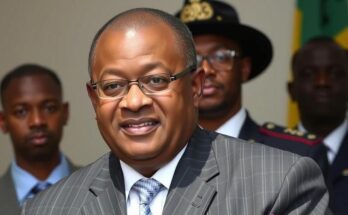Guinea-Bissau is set to elect new members to its National People’s Assembly on November 24 amid concerns of institutional illegitimacy. President Umaro Embaló’s previous dissolutions of the ANP have raised tensions and sparked fears over electoral credibility, particularly due to the dysfunctional state of the CNE and Supreme Court. Engaging political stakeholders and possibly postponing elections are necessary steps to restore legitimacy and avoid political crisis.
As Guinea-Bissau approaches the scheduled elections on November 24 for the new members of its National People’s Assembly (Assembleia Nacional Popular da Guiné-Bissau, or ANP), there looms a significant risk due to the perceived illegitimacy of the institutions conducting these elections. Following President Umaro Embaló’s controversial dissolution of the ANP in December 2022—marking the second such dissolution in less than two years—confidence in the electoral process is precarious. This dissolution was ostensibly enacted to alter power dynamics that had constrained the President’s authority, but it has only intensified political tensions within the country. The ANP had previously been under the control of the Inclusive Alliance Platform (PAI)-Terra Ranka coalition, which had gained an outright majority in the June 2023 legislative elections. The legitimacy of the upcoming elections has been further compromised by the expiration of the mandate for the Comissão Nacional de Eleições (National Elections Commission, or CNE) since April 2022. Due to internal political conflicts, the ANP has been unable to elect new members for the CNE, which means there is no functioning body to oversee the integrity of the elections. The government’s manipulation of the ANP leadership exacerbates this issue. Additionally, the functioning of the Supreme Court has been hampered by ongoing political strife. Since the forced resignation of its president, José Sambu, the Court has been unable to fulfill its vital role in validating political candidates and settling electoral disputes, further undermining the electoral process’s credibility. With more than half the judges subjected to disciplinary proceedings and unable to partake in cases, the Court currently lacks the quorum necessary for adjudication. This paralysis casts a shadow over the verification of candidate eligibility and the validation of election results. In light of these challenges, it is imperative for President Embaló to engage with political leaders and institutional representatives to re-establish stability and legitimacy within the electoral framework. This initiative would be critical not merely for the functioning of the electoral process but also for maintaining overall national stability, especially given the impending expiration of his term in February 2025. There is also a pressing need for the Economic Community of West African States (ECOWAS) to step forward and facilitate conditions conducive to credible elections. Such conditions could entail the postponement of the legislative elections to address pressing institutional issues and to reelect CNE and Supreme Court personnel. This postponement would create an environment of trust among political entities, potentially averting a legitimacy crisis for the President.
Guinea-Bissau, a nation characterized by political instability, is scheduled to conduct elections for the National People’s Assembly. These elections are crucial for the sustainability of democracy and political order. However, they face significant challenges, including the recent dissolution of the ANP by President Umaro Embaló, which raises concerns about the legitimacy of electoral oversight bodies like the CNE and Supreme Court. The current political climate is fraught with tension and institutional dysfunction, threatening the integrity of the electoral process and the very fabric of governance in the country.
In summary, the upcoming elections in Guinea-Bissau stand at a critical juncture, poised between the need for democratic processes and a backdrop of institutional dysfunction and political strife. To ensure the elections are credible and to mitigate risks to national stability, President Embaló must pursue dialogue with various political factions and institutional representatives. Additionally, support from ECOWAS may be vital to facilitate trust and resolve existing issues. Addressing these challenges effectively is essential for restoring legitimacy and fostering a stable environment conducive to democratic governance.
Original Source: www.premiumtimesng.com




